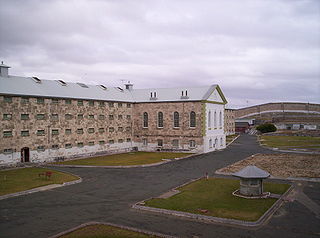A plea bargain is an agreement in criminal law proceedings, whereby the prosecutor provides a concession to the defendant in exchange for a plea of guilt or nolo contendere. This may mean that the defendant will plead guilty to a less serious charge, or to one of the several charges, in return for the dismissal of other charges; or it may mean that the defendant will plead guilty to the original criminal charge in return for a more lenient sentence.

In justice and law, house arrest is a measure by which a person is confined by the authorities to their residence. Travel is usually restricted, if allowed at all. House arrest is an alternative to being in a prison while awaiting trial or after sentencing.
Probation in criminal law is a period of supervision over an offender, ordered by the court often in lieu of incarceration.
A suspended sentence is a sentence on conviction for a criminal offence, the serving of which the court orders to be deferred in order to allow the defendant to perform a period of probation. If the defendant does not break the law during that period and fulfills the particular conditions of the probation, the sentence is usually considered fulfilled. If the defendant commits another offence or breaks the terms of probation, the court can order the sentence to be served, in addition to any sentence for the new offence.

Incarceration in the United States is one of the primary means of punishment for crime in the United States. In 2021, over five million people were under supervision by the criminal justice system, with nearly two million people incarcerated in state or federal prisons and local jails. The United States has the largest known prison population in the world. It has 5% of the world’s population while having 20% of the world’s incarcerated persons. China, with more than four times more inhabitants, has fewer persons in prison. Prison populations grew dramatically beginning in the 1970s, but began a decline around 2009, dropping 25% by year-end 2021.

A debtors' prison is a prison for people who are unable to pay debt. Until the mid-19th century, debtors' prisons were a common way to deal with unpaid debt in Western Europe. Destitute people who were unable to pay a court-ordered judgment would be incarcerated in these prisons until they had worked off their debt via labour or secured outside funds to pay the balance. The product of their labour went towards both the costs of their incarceration and their accrued debt. Increasing access and lenience throughout the history of bankruptcy law have made prison terms for unaggravated indigence obsolete over most of the world.

The United States Federal Sentencing Guidelines are rules published by the U.S. Sentencing Commission that set out a uniform policy for sentencing individuals and organizations convicted of felonies and serious misdemeanors in the United States federal courts system. The Guidelines do not apply to less serious misdemeanors or infractions.
Collateral consequences of criminal conviction are the additional civil state penalties, mandated by statute, that attach to a criminal conviction. They are not part of the direct consequences of criminal conviction, such as prison, fines, or probation. They are the further civil actions by the state that are triggered as a consequence of the conviction.
Administrative detention is arrest and detention of individuals by the state without trial. A number of jurisdictions claim that it is done for security reasons. Many countries claim to use administrative detention as a means to combat terrorism or rebellion, to control illegal immigration, or to otherwise protect the ruling regime.

Khalida Jarrar is a Palestinian politician. She is a member of the Popular Front for the Liberation of Palestine (PFLP) and the Palestinian Legislative Council (PLC). She was elected to the PLC in January 2006 as one of the PFLP's three deputies and has continued to serve as an elected representative ever since. She is also the Palestinian representative on the Council of Europe and is currently head of the Prisoners Committee of the PLC. She played a major role in Palestine's application to join the International Criminal Court.
The penal system in China is composed of an administrative detention system and a judicial incarceration system. As of 2020, it is estimated that 1.7 million people had been incarcerated in China, which is the second-highest prison population after the United States. China also retains the use of the death penalty with the approval of the Supreme People's Court, and there is a system of death penalty with reprieve in which the sentence is suspended unless the convict commits another major crime within two years while they are detained.

Pre-trial detention, also known as jail, preventive detention, provisional detention, or remand, is the process of detaining a person until their trial after they have been arrested and charged with an offence. A person who is on remand is held in a prison or detention centre or held under house arrest. Varying terminology is used, but "remand" is generally used in common law jurisdictions and "preventive detention" elsewhere. However, in the United States, "remand" is rare except in official documents and "jail" is instead the main terminology. Detention before charge is commonly referred to as custody and continued detention after conviction is referred to as imprisonment.

Canadian criminal law is governed by the Criminal Code, which includes the principles and powers in relation to criminal sentencing in Canada.

United States federal probation and supervised release are imposed at sentencing. The difference between probation and supervised release is that the former is imposed as a substitute for imprisonment, or in addition to home detention, while the latter is imposed in addition to imprisonment. Probation and supervised release are both administered by the U.S. Probation and Pretrial Services System. Federal probation has existed since 1909, while supervised release has only existed since 1987, when it replaced federal parole as a means for imposing supervision following release from prison.

Punishment in Australia arises when an individual has been accused or convicted of breaking the law through the Australian criminal justice system. Australia uses prisons, as well as community corrections. When awaiting trial, prisoners may be kept in specialised remand centres or within other prisons.
Private probation is the contracting of probation, including rehabilitative services and supervision, to private agencies. These include non-profit organizations and for-profit programs. The Salvation Army's misdemeanor probation services initiated in 1975, condoned by the state of Florida, is considered to be among the first private probation services. The private probation industry grew in 1992, when "local and county courts began outsourcing misdemeanor probation cases to private companies to alleviate pressure on overburdened state probation officers."
Criminal justice reform seeks to address structural issues in criminal justice systems such as racial profiling, police brutality, overcriminalization, mass incarceration, and recidivism. Criminal justice reform can take place at any point where the criminal justice system intervenes in citizens’ lives, including lawmaking, policing, and sentencing.

Norway's criminal justice system focuses on the principles of restorative justice and the rehabilitation of prisoners. Correctional facilities in Norway focus on maintaining custody of the offender and attempting to make them functioning members of society. Norway's prison system is renowned as one of the most effective and humane in the world.

Lifetime probation is reserved for relatively serious legal offenders. The ultimate purpose of lifetime probation is to examine whether offenders properly maintain good behavior as well as capability of patience under lifetime probation serving circumstance. An offender is required to abide by particular conditions for rest of their entire life in order to nurture superior social behaviour as a punishment for their criminal offence. Condition of probation orders contain supervision, electronic tagging, reporting to his or her probation or parole officer, as well as attending counselling. The essential component of lifetime probation carries the sense of being examined for well-being character and behaviour for life term period. Legislative framework regarding probation may vary depending on the country or the state within a certain country as well as the duration and condition of probational sentencing.

On 14 May, authorities froze the assets of pro-democracy media tycoon Jimmy Lai. This was the first time that the pertaining provision in Article 43 of the national security law was applied. While Chief Executive Carrie Lam said on 18 May that the move would serve to bolster the status of Hong Kong as an international financial hub, several senior bankers and corporate lawyers not associated with Lai's accounts opined that the action – which was followed at the end of the month by a warning from the Security Secretary to banks against dealing with the frozen assets – was exposing risks for clients and top financial managers in Hong Kong.











